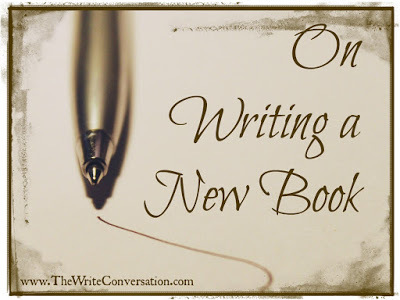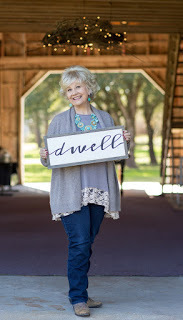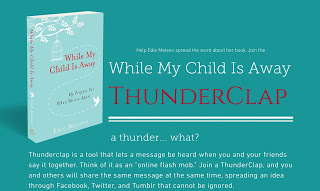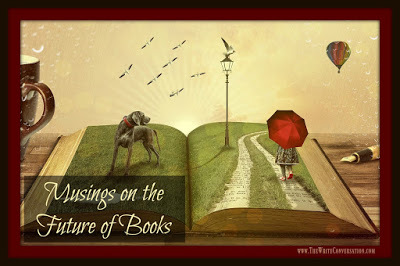Edie Melson's Blog, page 334
August 19, 2016
19 Things to Say to a Writer Facing Disappointment
 by Edie Melson @EdieMelson
by Edie Melson @EdieMelsonA writer’s journey is full of ups and downs. Sometimes we’re on top of the world—the words flow and the opportunities abound. Other times, well, not so much.
Everyone who reads this blog knows that preach over and over that we can’t do this writing thing alone. But it’s hard to know what exactly to say to an author buddy when difficult times hit. Especially if those difficult times coincide with a good time for you.
Today I’m going to share some things to remind each other about when the going gets tough.19 Things to Say1. A writing career is like the weather in Texas (or whatever state you happen to prefer). If you don’t like how it’s going, wait 10 minutes and it will change.
2. This experience will make a good story. Remind them that they’ll look back on this when asked how it feels to be an overnight success.
 Turn the rejection upside down. 3. Turn the rejection upside down, and use it to your advantage. When I first started as a freelance writer, I knew that if I received a certain number of rejections every month, then I get a certain number of acceptances. So I made my goal each month to reach a specific number of rejections.
Turn the rejection upside down. 3. Turn the rejection upside down, and use it to your advantage. When I first started as a freelance writer, I knew that if I received a certain number of rejections every month, then I get a certain number of acceptances. So I made my goal each month to reach a specific number of rejections.4. You are a good writer.Success has nothing to do with perfection. We all have those awful voices that live in our heads trying to convince us our writing stinks. It helps to have other writers tell us the truth.
5. Your time will come.No matter how much talent we start out with, it’s perseverance that gets us over the finish line.
6. There truly is plenty of work to go around.We work for a big God and He has plans for this gift He’s given us.
7. Every writer’s journey is different.Writers are masters a comparison. We try to judge our own worth by what others have or have not accomplished. We need to look within, not without when measuring our success.
8. Failure isn’t necessarily a bad thing. More often than not it’s also the shortest path to success. Learn from your mistakes, isn’t just a cliché, it’s a truth. Don’t beat yourself up when you fail, learn what you can and keep moving forward.
 Courage isn't the absence of fear.9. Courage isn’t the absence of fear.All writers struggle with fear—fear of failure, fear of not being good enough, fear of success. The key is to fight. Don’t give up, don’t give in.
Courage isn't the absence of fear.9. Courage isn’t the absence of fear.All writers struggle with fear—fear of failure, fear of not being good enough, fear of success. The key is to fight. Don’t give up, don’t give in.10. You’re not alone. Your writing friends won’t leave you behind. Just like number 5, all our journeys are different. But we’re on the path together.
11. These sudden shifts are an opportunity, instead of a liability. For example, if the bottom drops out of the genre you’re writing with traditional publishers, look at the opportunities with smaller houses or self publishing.
12. Comparison is a deadly trap to be avoided at all costs. There are always going to be people ahead of us, behind us, and right beside us. We all have different gifts and God has a different—special—plan for us all. Comparison isn’t accurate and it can be deadly.
13. Remember the WHY to get through the HOW.When difficult times come, it’s the why that will carry us through. Write down why you write. Post it above your desk and let it remind you why you’re here.
14. We’re not responsible for the results, only the work. We can’t guarantee ourselves publication at any particular time or with any particular company. What we can do is write with excellence. If we do that, publication will follow.
15. We live in one of the best times ever to be a writer. It’s easy to look at all the changes and general chaos as nothing but negative. The truth is though, we can reach more people through our words than ever before. And anyone who wants to reach the world through words needs a writer to help them.
 Writing is a journey, not a destination.16. Writing is a journey, not a destination.When we get started on the writing road, we mistake milestones for destinations. It’s easy to think there’ll be a time when we’ve arrived. Truthfully, that never happens. Each achievement is just a gateway to the next part of our writing journey.
Writing is a journey, not a destination.16. Writing is a journey, not a destination.When we get started on the writing road, we mistake milestones for destinations. It’s easy to think there’ll be a time when we’ve arrived. Truthfully, that never happens. Each achievement is just a gateway to the next part of our writing journey.17. Prayer changes things.It doesn’t always change our circumstances, but it always changes us.
18. You haven't failed until you quit. That truly is the only way to fail completely as a writer.
19. Share an instance when you faced disappointment. Don't lead with that, it's not a contest to see who's disappointment was bigger, but it helps to know we're not the only ones to face challenges. The important thing is to not shy away and feel like our own success will make it worse. Remind them of what they already know and walk through it with them.
What has someone said to you that has helped when you've faced a writing disappointment? Be sure to share your thoughts in the comments section below!
Don't forget to join the conversation!Blessings,Edie
TWEETABLES19 Things to Say to a Writer Facing Disappointment - @EdieMelson (Click to Tweet)
Remember the WHY to get through the HOW, plus 18 other tips to weather #writing struggles. (Click to Tweet)
Published on August 19, 2016 01:00
August 18, 2016
5 Ways to Write Using the Five Senses—Touch
 by Cyle Young @CyleYoung
by Cyle Young @CyleYoungDifferent body parts experience the sensation of touch in unique ways. Fingertips have heightened levels of sensitivity, but the tip of an elbow is desensitized.
Depending on how you touch on object with certain body parts the feeling or experience will be different and should be described relative to the sensation.A few weeks ago I went camping in Northern Michigan. As I hung my hammock in the trees, the continual prick of pine needles tickled against my bare arms and legs. Sometimes, I’d turn the wrong way and the pointed ends of the pine branches jabbed into my skin like sharp knives. In mere seconds my goosebumps transformed into searing pain.
The ground was covered with a thick layer of dead pine needles providing a soft pillow-like cushion for going barefoot. Each step felt as though I walked on puffy clouds.
In only a few minutes I was able to experience three distinct ways to experience the sense of touch as it relates to pine needles. Depending on the nature of my trip, I could use any of these three descriptions to set a specific tone for a story. If I was writing a happy joy filled scene, I could describe the fluffy cloud-like layer of pine needles. Or, if I was writing about a bad trip, I could describe the scene using the piercing pain of pine branches. Both ways set different tones and atmosphere for a story.
You can use your sense of touch to set powerful tones for your writing scenes.
Take at least 60 seconds and stare at the image below. Put yourself in this setting. What do you feel? What can you touch?

How many different ways can you describe the feel of the same object? Such as the water? The sand? The forest?
Challenge yourself to go deeper in your writing and describe your scene using the powerful sense of touch.
Leave your unique description of what you can “feel” in the comments below. Make sure to take the time to always “touch” your setting, or storyworld and take care to describe it in an exceptionally engaging way.
TWEETABLE
5 Ways to #Write Using the Five Senses, Touch - @CyleYoung on@EdieMelson (Click to Tweet)
Don't forget to round out your #writing with all 5 senses - @CyleYoung (Click to Tweet)
 Cyle Young is thankful God blessed him with the uniqueness of being an ADD-riddled…SQUIRREL!...binge writer. Not much unlike the classic video game Frogger, Cyle darts back and forth between various writing genres. He crafts princess children’s stories, how-to advice for parents, epic fantasy tales, and easy readers.
Cyle Young is thankful God blessed him with the uniqueness of being an ADD-riddled…SQUIRREL!...binge writer. Not much unlike the classic video game Frogger, Cyle darts back and forth between various writing genres. He crafts princess children’s stories, how-to advice for parents, epic fantasy tales, and easy readers.
Published on August 18, 2016 01:00
August 17, 2016
10 Tools for the Bible Study Writer—Hunting for Treasure
 by Katy Kauffman @KatyKauffman28
by Katy Kauffman @KatyKauffman28I have a confession to make. I love to stop at tourist traps and pan for gold. It’s like a mini-adventure when I get to sift through a pan of dirt and discover treasures for myself.
Sifting through lumps of mud, shaking the pan anxiously, waiting for the moment when a piece of gold or pyrite catches my eye. A little work, a little waiting—and then the reward!
I like “panning for gold” in the Bible too. Some treasures are lying on the surface, waiting to be picked up and cherished. Other treasures are buried just beneath the surface, and require a little more work, a little more digging. Still others take so much time and attention that sometimes we wonder if we’ll ever understand them, until all of a sudden, it happens! Something jogs our memory, a circumstance of life fills in the gap we’re missing, or all of the pieces of the study fall into place. We get it. We understand. And the sifting and digging were worth it.
The Bible study writer is an adventurer, a hunter of gems, a treasure enthusiast. We hunt for treasures in Scripture—truths that show us who God is, who we can be in Christ, and how life works with Him. We hunt for understanding so we can know the truth and live it, and so we can share the treasures we’ve discovered with others.
It’s always been hard for me to sit still and read commentaries. Till I saw the understanding—the treasures—they supplied. Yet commentaries aren’t the only way to know what Scripture is talking about. There are at least 10 tried and true “sifting and digging” tools that help us to discover the treasures in the Bible. Do you have all of them in your tool box?
10 Awesome Sifting and Digging Tools
 1. Prayer– Ask God to open your heart and mind to understand Scripture, and thank Him for the understanding He gives. Ask Him to show you the nuggets of gold that are sitting on the surface and to lead you to discover the treasures that are lying a little beneath it. Ask Him to prepare your heart to understand the deeper truths of His Word and to see how to apply them in daily experiences and circumstances.
1. Prayer– Ask God to open your heart and mind to understand Scripture, and thank Him for the understanding He gives. Ask Him to show you the nuggets of gold that are sitting on the surface and to lead you to discover the treasures that are lying a little beneath it. Ask Him to prepare your heart to understand the deeper truths of His Word and to see how to apply them in daily experiences and circumstances. 2. 5 Ws and H– Ask who, what, when, where, why, and how about the people and events in a passage, and how they illustrate spiritual insights. Write down the answers that come to mind so they can simmer while you study.
3. Repeated Elements– God uses repeated words and phrases to emphasize what He wants us to know, understand, and practice. These words provide “ready” treasures and points of discussion for a small group and points of reflection for a personal study.
4. Contrasts & Comparisons – Word pictures are powerful teaching tools. Identify these by looking for the key word “but” for contrasts and the key words “like” or “as” for comparisons. Sometimes God emphasizes major truths with these two tools.
5. Context – This is the screen, the pan, the setting which helps us to see treasures that we might otherwise miss. The context of a chapter and book of the Bible brings to the surface specific application we can find in a passage.
6. Bible Dictionaries– These scholars have already done some of the sifting and digging for us. Plus, they know the difference of how words were used in Biblical times versus how they are used today, and they explain it to us.
7. Cross-References– These compare treasures with treasures. They also furnish additional insight as we use Scripture to pan for more understanding.
8. Lists – Sometimes Scripture helps our treasure hunt by organizing great elements together. Looking for God’s names in a chapter or passage, or what Jesus can do, how to persevere, how to overcome obstacles of the Christian life, and so forth, can enrich our understanding. This process can also give us topics for discussion or reflection.
9. Application– Look for priceless treasures. Ask yourself if there are any promises to cherish, instructions to obey, truths to believe, encouragement to accept, or warnings to heed.
10. Trustworthy Commentaries – Build on the understanding (and treasure hunting) of the generations who have come before you.
Even if it takes two hours of research for us to write five minutes worth of reading material, those five minutes may change someone’s life forever. Keep using all the sifting and digging tools God has given us, and I hope your own heart is blessed with the treasures you find.
What tools do you use to understand Scripture better? Keep up the treasure hunting, and don’t forget to join the conversation!
TWEETABLES
10 Tools for the Bible Study Writer - @KatyKauffman28 (Click to Tweet)
Tips for Bible study writers as they "pan" for gold - @KatyKauffman28 (Click to Tweet)
 Katy Kauffman is an award-winning author and a co-founder of Lighthouse Bible Studies, a ministry which seeks to connect people to God through His Word.
Katy Kauffman is an award-winning author and a co-founder of Lighthouse Bible Studies, a ministry which seeks to connect people to God through His Word.She has taught the Bible to women and teens, and has two published Bible studies for women, 2 Timothy: Winning the Victory and Faith, Courage, and Victory which won the 2016 Selah award for Bible studies. She is an editor of Refresh Bible Study Magazine and the designer of Broken but Priceless: The Magazine. She makes her home near Atlanta, Georgia.
Published on August 17, 2016 01:00
August 16, 2016
On Writing a New Book
 by Lucinda Secrest McDowell @LucindaSMcDowel
by Lucinda Secrest McDowell @LucindaSMcDowelToday I began writing a new book. I gasp as I realize this is number thirteen to be published under my name (I’m not superstitious). Did you think I would be calm with this process by now? The truth—I am in awe. That a fine publisher has offered me a contract. That amazing people actually buy the books I write. But mostly, friend, I am in awe that the God of the universe would deign to offer me a part in helping to further His kingdom here on earth. Through words.And so I humbly turn to Jesus—the “Word made flesh”who joined us here on earth so that we would always know that He knows—and I pray “Thank You.” For this privilege. But also for this hard work that is ahead. Because writing is work. It is digging deep for the pearls, sharing vulnerably, sometimes saying hard things, throwing away countless crumpled pages, finding courage to start over, allowing others to critique and cut your story, second-guessing your abilities, and praying over every single word and phrase. After the initial euphoria of signing the contract (“You like me, you really like me!”), inevitably the panic sets in. “Who am I to write this book?” I love the way my friend Robert Benson captures it: “At the beginning of a new book I find it easier to write if I do not think about the fact that I am attempting to write a book. Who in the world needs another book anyway? …Last week while reading Buechner, I realized that if I wanted to make a contribution to the literary world, I should do his laundry and mow his grass so he would have more time to write.” (from “Dancing on the Head of a Pen”) I am convinced God calls each of us to share our unique story in just the manner He equipped us to do it. For me that is in writing and speaking and teaching. I say this with humility, but I also say it with conviction. Because honey, you need to know who you are and who you aren’t in order to fulfill God’s purposes for your life! My book will not look like the current bestselling book that you just loved and ordered copies for all your friends. Because I’m not her. I don’t write what she writes or in the same way she writes it. Nor should I. The world already has her. As I begin this journey, I pray fervently that God will give me insight and my own unique voice to speak into the darkness.
 For writers, writing is an act of obedience to God's call.I gather my materials—my Bible, journals, research, outlines—and as I look at the pile, I am truly overwhelmed. Yet I am a participant—a partner—with God on this project. And since nothing really happens until I begin writing…. I start with word one. For writers, writing is an act of obedience to God’s call.
For writers, writing is an act of obedience to God's call.I gather my materials—my Bible, journals, research, outlines—and as I look at the pile, I am truly overwhelmed. Yet I am a participant—a partner—with God on this project. And since nothing really happens until I begin writing…. I start with word one. For writers, writing is an act of obedience to God’s call. In “The Soul Tells a Story” we are reminded: “You are called to a work, and you respond with your particular gifts, vision and energy. You’re rarely sure of what it is you’re about to do, but you have an idea, along with the desire to carry it out. You say yes and then hope that you still will live up to the yes. You feel honored but maybe a bit scared too.” (Vinita Hampton Wright) Today I begin with great faith and great gratitude. With hope and yes, some humble hesitancy. I begin the work because I want to offer my best back to my Creator. What are you beginning today? What are you not beginning because you feel afraid or unworthy? I don’t know what God’s call on your life looks like. I don’t know where the path is taking you. But I’m convinced He is beside both of us each step of the way. And so I step forward…. and begin.
“May our Lord Jesus Christ Himself and God our Father, who has loved us and given us eternal encouragement and good hope by grace, encourage your hearts and strengthen you in every good Work and Word.” (2 Thessalonians 2:16-17)
TWEETABLES"For writers, #writing is an act of obedience to God’s call." @LucindaSMcDowel (Click to Tweet)
Thoughts on #writing a new book - @LucindaSMcDowel (Click to Tweet)
 Lucinda Secrest McDowell is passionate about embracing life — both through deep soul care from drawing closer to God, as well as living courageously in order to touch a needy world. A storyteller who engages both heart and mind, she offers “Encouraging Words” to all on the journey. A graduate of Gordon-Conwell Theological Seminary and Furman University, Cindy is the author of twelve books, including Dwelling Places, Live These Words, Refresh!, Amazed by Grace, Quilts from Heaven and Role of a Lifetime. Whether co-directing the “New England Christian Writers Retreat,” mentoring young moms, or leading a restorative day of prayer, she is energized by investing in people of all ages. She has also served as faculty at Writers Conferences in Florida, Blue Ridge, Atlanta and Philadelphia and emceed Author Events at the Mark Twain House in Hartford. Cindy’s favorites include tea parties, good books, laughing friends, ancient prayers, country music, cozy quilts, musical theatre, and especially her family scattered around the world doing amazing things. She writes from “Sunnyside” cottage in New England and blogs weekly at EncouragingWords.net
Lucinda Secrest McDowell is passionate about embracing life — both through deep soul care from drawing closer to God, as well as living courageously in order to touch a needy world. A storyteller who engages both heart and mind, she offers “Encouraging Words” to all on the journey. A graduate of Gordon-Conwell Theological Seminary and Furman University, Cindy is the author of twelve books, including Dwelling Places, Live These Words, Refresh!, Amazed by Grace, Quilts from Heaven and Role of a Lifetime. Whether co-directing the “New England Christian Writers Retreat,” mentoring young moms, or leading a restorative day of prayer, she is energized by investing in people of all ages. She has also served as faculty at Writers Conferences in Florida, Blue Ridge, Atlanta and Philadelphia and emceed Author Events at the Mark Twain House in Hartford. Cindy’s favorites include tea parties, good books, laughing friends, ancient prayers, country music, cozy quilts, musical theatre, and especially her family scattered around the world doing amazing things. She writes from “Sunnyside” cottage in New England and blogs weekly at EncouragingWords.net
Published on August 16, 2016 01:00
August 15, 2016
Tips for Tromping Trolls on Social Media
 by Molly Jo Realy @RealMoJo68
by Molly Jo Realy @RealMoJo68Social media is one of those love-hate relationships. There’s a lot of good buzz it can create, but there’s also a bitter aftertaste if a troll decides to attack your territory.
It’s important to understand the difference between trolls and someone who just doesn’t like you. You have every right to delete inflammatory comments and keep peace on your pages, but be careful to not manipulate the system so you’re only seeing the sunny side of things. If a person voices their dislike, let them know it’s okay and different people have different views.When those views, comments, reviews, and posts turn into hurt and hate, it’s time to tromp that troll!
What’s a troll? Well, they’re not those cute little dolls from the 80s. No, the trolls I’m talking about are people who actively seek out posts with the intent of posting, well, less than sweet comments. They start arguments, throw insults, and pretty much like to turn things sideways.
 One of the ways you can conquer these little nuisances is to have a comment filter on your blog settings. These automatically search for words you’ve flagged as offensive or inappropriate. You may want to take it a step further and add a captcha filter. This requires the commenter to manually type numbers and/or letters they see in a small photo, to prove they’re not a robot or automated reply. On most social media sites, you can report inappropriate comments and block users.
One of the ways you can conquer these little nuisances is to have a comment filter on your blog settings. These automatically search for words you’ve flagged as offensive or inappropriate. You may want to take it a step further and add a captcha filter. This requires the commenter to manually type numbers and/or letters they see in a small photo, to prove they’re not a robot or automated reply. On most social media sites, you can report inappropriate comments and block users. Trolls can be hard to handle. It’s always a good idea to never respond. Even when you feel like defending yourself, clarifying your position, or just plain stopping the madness. Trolls feed off the chaos they create. If you stop responding to them, most of the time they’ll move on.
With some sweet tea, a spoonful of honey, and some heavy Army boots,~ Happy writing.
Molly Jo
TWEETABLETips for Tromping Trolls on #SocialMedia - @RealMoJo68 on @EdieMelson (Click to Tweet)
 Molly Jo is a writer, editor, social media ninja, and producer of the weekly Firsts in Fiction podcast. She has been featured in children’s magazines, on blogs and devotional websites, and her short stories have earned her awards and scholarships from nationally acclaimed writing programs. She is the founder of New Inklings Press and author of
The Unemployment Cookbook: Ideas for Feeding Families One Meal at a Time,
and other books available through her website and on Amazon.
Molly Jo is a writer, editor, social media ninja, and producer of the weekly Firsts in Fiction podcast. She has been featured in children’s magazines, on blogs and devotional websites, and her short stories have earned her awards and scholarships from nationally acclaimed writing programs. She is the founder of New Inklings Press and author of
The Unemployment Cookbook: Ideas for Feeding Families One Meal at a Time,
and other books available through her website and on Amazon.Her current work in progress, NOLA, is a location mystery set in New Orleans and is scheduled for publication in late 2016.
You can find her on Facebook, Twitter, Pinterest, and her blog, Frankly, My Dear . . .
Published on August 15, 2016 01:00
August 14, 2016
The Life in Words
 by Sarah Van Diest @SarahVanDiest
by Sarah Van Diest @SarahVanDiestMy words rest on the page as if sleeping.
They are worn out from their journeys and struggles. The stories they would tell if they weren’t so tired are of an epic nature, I am sure. Where they have traveled, what they have seen and endured, how they have suffered and triumphed, and what miseries and hopes they have carried! They are weary, and for good reason. “The road has been long” is an underdeveloped expression of their experience.New life is breathed into them only with exposure to fresh eyes. Until that transformative moment where they are enlivened once again, they remain still and lifeless, though full of the potential energy which an encounter could excite.
They wait for you. Encapsulated and insulated in their hulls is the heart that beats in me and the mind that whirrs, and imbedded further still in that heart and in that mind is our Father’s Spirit eager to connect us all together. Those sleeping words, lying dormant on the page, are the bottle in the ocean and our Father’s Spirit is the message rolled up inside. I do not say this to claim I speak for the Father, but to say the overflow of the heart spills into our words.
 Our words are a gift from the Father who first spoke creation into existence. He lives in our words when our hearts “…have been crucified with Christ; (and) it is no longer I who live, but Christ lives in me; and the life I now live in the flesh I live by faith in the Son of God who loved me, and delivered Himself up for me” Gal. 2:20. Words live in us and in the Word we have life. Beautiful and graceful, ethereal in nature, yet more solid than the foundations of the earth, words are our essence and very existence.
Our words are a gift from the Father who first spoke creation into existence. He lives in our words when our hearts “…have been crucified with Christ; (and) it is no longer I who live, but Christ lives in me; and the life I now live in the flesh I live by faith in the Son of God who loved me, and delivered Himself up for me” Gal. 2:20. Words live in us and in the Word we have life. Beautiful and graceful, ethereal in nature, yet more solid than the foundations of the earth, words are our essence and very existence. I write them for you. They wait for you.
But here I turn and twist to see another view of the words on my page. If I look closely, with stillness in my breast, if clarity and calm define as my eyes fall upon the resting words, I see the life within them rising, and their weariness dropping off, untethering them from the page. The Spirit that lives in me infuses them with life and I love them once again. My eyes have become fresh and so I see their newness myself.
How kind the Father is. My words do not just wait for you, but wait for me as well. They hold within them the Spirit that lives to bring life; to bring comfort; to bring joy and peace. I say again, how kind the Father is.
Now I turn the eyes of my heart to you, dear reader. Your words. Your heart. Your mind. The Father lives there. The Father loves there. With all I have within me, I urge you to write, to speak, to use your words to bring life. As you keep them to yourself, hiding them in your fears as we all do at times, they push against the walls of your heart, longing to find their next landing place. They landed first in you, but there are other hearts they need to find as well. They came to bring comfort and hope, and that’s what their purpose is. Share them. Please. Our world needs life-giving words.
That’s how we first came about:
“In the beginning was the Word, and the Word was with God, and the Word was God. He was in the beginning with God. All things came into being through Him, and apart from Him nothing came into being that has come into being. In Him was life, and the life was the Light of men. The Light shines in the darkness, and the darkness did not comprehend it” John 1:1-5.
Our words may seem tired. They may lie lifeless on the page, but as the Spirit works, they quicken and live. The darkness cannot comprehend it. The darkness cannot overtake the life the Spirit brings.
So, be not hindered. Say it, email it, pray it, and by all means, if you are a writer…write!
 Educated as a teacher, Sarah taught school for nearly 20 years. As a young woman, she lived in China amid the rice paddies and water buffalo near Changsha, and then later taught English in Costa Rica for four years and raised her two sons.
Educated as a teacher, Sarah taught school for nearly 20 years. As a young woman, she lived in China amid the rice paddies and water buffalo near Changsha, and then later taught English in Costa Rica for four years and raised her two sons. Sarah is married for the second time, the mother of 2 boys and the step-mother to 3 more. She and her husband, David, work together in their agency The Van Diest Literary Agency. Her full name is Sarah Ruth Gerke Van Diest. She’s 5’5” and cuts her hair when stress overtakes her. She is a freelance editor (including a New York Times and USA Today bestseller), blogger (The Write Conversation) and writer for hire. Her first book releases with NavPress in 2018.
http://christianliteraryagency.com/ https://www.facebook.com/sarah.gerkevandiest https://twitter.com/SarahVanDiest http://thewriteconversation.blogspot.com/
Published on August 14, 2016 01:00
August 13, 2016
Loved or Understood?
 by Beth Vogt @BethVogt
by Beth Vogt @BethVogtLoved or understood? Do we have to choose between the two?
I don’t think so.
When we take the time to understand someone else, isn’t that a form of loving that person? Understanding someone demands concentrated effort. Sometimes we must set aside prejudices and preconceived ideas about a person. Understanding happens when we listen. When we consider someone else more important than ourselves — when we let their story take precedence over ours.
It’s not so much which came first: loving or understanding? It’s more that you can’t have one without the other. If you understand someone, you can’t help but care for them in at least some small way. And if you love someone, then you are willing to put in the effort to understand them — to ask who are you and why are you who you are?
In Your Words: If you had to choose, would you want to be loved or understood? Why? And what do you think of George Orwell’s quote? Is it a matter of choosing one or the other — or are being loved and being understood intertwined?
TWEETABLE
Loved or understood? Do we have to choose between the two? @BethVogt (Click to Tweet)
 Beth K. Vogt believes God’s best often waits behind the doors marked “Never.”
Beth K. Vogt believes God’s best often waits behind the doors marked “Never.” A nonfiction writer and editor who said she’d never write fiction, Beth is now a novelist with Howard Books. She enjoys writing inspirational contemporary romance because she believes there’s more to happily-ever-after than the fairy tales tell us. Connect with Beth on her website, Twitter, Facebook, or check out her blog on quotes, In Others’ Words.
Published on August 13, 2016 01:00
August 12, 2016
Specifics on How My Street Team Marketing Has Worked, ThunderClap Marketing, and Winners Announced
by Edie Melson @EdieMelson
 A ThunderClap for While My Child is Away!First, a THUNDERCLAP!Before I get to the update on my street team, I want to share something else that my publisher is doing to get the word out about my book. They have set up a ThunderClap. This wasn’t something I’d heard of until they introduced me to it, but I’ve done a good bit of research since then and see how it’s a great marketing idea.
A ThunderClap for While My Child is Away!First, a THUNDERCLAP!Before I get to the update on my street team, I want to share something else that my publisher is doing to get the word out about my book. They have set up a ThunderClap. This wasn’t something I’d heard of until they introduced me to it, but I’ve done a good bit of research since then and see how it’s a great marketing idea.
The idea stems from a flash mob, only it takes place online.For my campaign, we’ve designated the minimum number of 100 participants. These people agree to let ThunderClap send out a single automated social media update through the accounts of those who sign up. This update is sent through all 100 accounts at the exact same time. This multiplies the visibility exponentially and generates huge views, shares and hits.
The only drawback is that if I don’t get 100 people to sign up, the ThunderClap won’t happen.
I’m sharing this for two reasons:It’s a great marketing tool, with many different payment levels (from free on up), and we need to know about ways to market our books!I’m still 30 people away from my 100. I only have until the end of August to get the final 30 signups.
To see what ThunderClap will share. read more specifics, and sign up visit: What is Edie’s ThunderClap?
 Specifics on how my street team marketing has worked.Specifics on How My Street Team Marketing Has Worked
Specifics on how my street team marketing has worked.Specifics on How My Street Team Marketing Has Worked
Back in April I wrote a post about developing a street team to help market my newest book, While My Child is Away . I also promised I’d update you and let you know how it went.
In a word, it’s been WONDERFUL!
My prayer is that those participating in the street team have also gotten some value through the experience.
We had to tweak things as we went, but overall, it’s been a pretty seamless process. Here’s how it worked out:I ended up with 28 members of the street team—27 women and 1 man.Because of timing, we decided to spread the 6 week study over the 3 weeks before and 3 weeks after the book released.I learned how to use MailChimp to send out a weekly update to the team and that has worked extremely well. It has been an added benefit that I’ve learned how to utilize this valuable tool.For the study, I posted 4 discussion questions on the private Facebook group page every week. To avoid confusion, each question got it’s own post and the discussions have been great. Not everyone can participate every week, but that was expected and has not been an issue. Actually I like it that the members of the team haven’t felt stressed about living up to expectations.Each week I also recorded a short video that introduces the topic we’re focusing on for that week. This has been a bit out of my comfort zone, but I’ve gotten more relaxed with it and I’m truly glad I’ve done it.
Now the bottom line from an author’s perspective. Was it worth the effort?Was it worth the effort? I say absolutely! Just the interaction with my team and the privilege of banding together with them in prayer for our kids makes this a winning situation. But beyond that, my social media visibility numbers have been super. According to my publisher, several weeks in we’d already gotten over 200,000 social media views, shares, likes, and interactions.
Was it worth the effort?Was it worth the effort? I say absolutely! Just the interaction with my team and the privilege of banding together with them in prayer for our kids makes this a winning situation. But beyond that, my social media visibility numbers have been super. According to my publisher, several weeks in we’d already gotten over 200,000 social media views, shares, likes, and interactions.
What kind of time was required? I spent time each week making the video, writing the content for the email update, and interacting on Facebook. I’d say around 4 – 6 hours each week. It did take time, but it was time well spent.What kind of money did I spend? This is a little harder to quantify because my publisher, Worthy Inspired, did so much. They developed the landing page and uploaded everything to it each week. They developed the memes that I shared, and they even generated the click to tweets. Even with that, I think an author without the publisher partner I had could spend more time and still follow this example. The only money I spend was on the gifts that I sent (and am still sending) my team and the postage.
But I would love to hear from some of you who are on the prayer street team. Has it been valuable to you at all? Be sure to leave your thoughts in the comments section below.
I'd also be happy to answer any questions you have about ThunderClap or my prayer street team.
Don't forget to join the conversation!
Blessings,
Edie
TWEETABLES
How street team #marketing worked for this author - @EdieMelson (Click to Tweet)
Unexpected benefits from building a prayer street team for my newest book - @EdieMelson (Click to Tweet)
And no, I haven't forgotten! Those of you who helped advertise my book signing went into a drawing for two Barnes & Noble $15 and Amazon $15 gift cards.
The winners are:
For the 2 Barnes and Noble e-giftcards: Ellen Andersen and Loraine Nunely
For the 2 Amazon e-giftcards: Robin Mason and Robert Frohlich.
Please contact me through email and I'll send them your way: ediegmelson (at) gmail (dot) com.
 A ThunderClap for While My Child is Away!First, a THUNDERCLAP!Before I get to the update on my street team, I want to share something else that my publisher is doing to get the word out about my book. They have set up a ThunderClap. This wasn’t something I’d heard of until they introduced me to it, but I’ve done a good bit of research since then and see how it’s a great marketing idea.
A ThunderClap for While My Child is Away!First, a THUNDERCLAP!Before I get to the update on my street team, I want to share something else that my publisher is doing to get the word out about my book. They have set up a ThunderClap. This wasn’t something I’d heard of until they introduced me to it, but I’ve done a good bit of research since then and see how it’s a great marketing idea. The idea stems from a flash mob, only it takes place online.For my campaign, we’ve designated the minimum number of 100 participants. These people agree to let ThunderClap send out a single automated social media update through the accounts of those who sign up. This update is sent through all 100 accounts at the exact same time. This multiplies the visibility exponentially and generates huge views, shares and hits.
The only drawback is that if I don’t get 100 people to sign up, the ThunderClap won’t happen.
I’m sharing this for two reasons:It’s a great marketing tool, with many different payment levels (from free on up), and we need to know about ways to market our books!I’m still 30 people away from my 100. I only have until the end of August to get the final 30 signups.
To see what ThunderClap will share. read more specifics, and sign up visit: What is Edie’s ThunderClap?
 Specifics on how my street team marketing has worked.Specifics on How My Street Team Marketing Has Worked
Specifics on how my street team marketing has worked.Specifics on How My Street Team Marketing Has WorkedBack in April I wrote a post about developing a street team to help market my newest book, While My Child is Away . I also promised I’d update you and let you know how it went.
In a word, it’s been WONDERFUL!
My prayer is that those participating in the street team have also gotten some value through the experience.
We had to tweak things as we went, but overall, it’s been a pretty seamless process. Here’s how it worked out:I ended up with 28 members of the street team—27 women and 1 man.Because of timing, we decided to spread the 6 week study over the 3 weeks before and 3 weeks after the book released.I learned how to use MailChimp to send out a weekly update to the team and that has worked extremely well. It has been an added benefit that I’ve learned how to utilize this valuable tool.For the study, I posted 4 discussion questions on the private Facebook group page every week. To avoid confusion, each question got it’s own post and the discussions have been great. Not everyone can participate every week, but that was expected and has not been an issue. Actually I like it that the members of the team haven’t felt stressed about living up to expectations.Each week I also recorded a short video that introduces the topic we’re focusing on for that week. This has been a bit out of my comfort zone, but I’ve gotten more relaxed with it and I’m truly glad I’ve done it.
Now the bottom line from an author’s perspective.
 Was it worth the effort?Was it worth the effort? I say absolutely! Just the interaction with my team and the privilege of banding together with them in prayer for our kids makes this a winning situation. But beyond that, my social media visibility numbers have been super. According to my publisher, several weeks in we’d already gotten over 200,000 social media views, shares, likes, and interactions.
Was it worth the effort?Was it worth the effort? I say absolutely! Just the interaction with my team and the privilege of banding together with them in prayer for our kids makes this a winning situation. But beyond that, my social media visibility numbers have been super. According to my publisher, several weeks in we’d already gotten over 200,000 social media views, shares, likes, and interactions.What kind of time was required? I spent time each week making the video, writing the content for the email update, and interacting on Facebook. I’d say around 4 – 6 hours each week. It did take time, but it was time well spent.What kind of money did I spend? This is a little harder to quantify because my publisher, Worthy Inspired, did so much. They developed the landing page and uploaded everything to it each week. They developed the memes that I shared, and they even generated the click to tweets. Even with that, I think an author without the publisher partner I had could spend more time and still follow this example. The only money I spend was on the gifts that I sent (and am still sending) my team and the postage.
But I would love to hear from some of you who are on the prayer street team. Has it been valuable to you at all? Be sure to leave your thoughts in the comments section below.
I'd also be happy to answer any questions you have about ThunderClap or my prayer street team.
Don't forget to join the conversation!
Blessings,
Edie
TWEETABLES
How street team #marketing worked for this author - @EdieMelson (Click to Tweet)
Unexpected benefits from building a prayer street team for my newest book - @EdieMelson (Click to Tweet)
And no, I haven't forgotten! Those of you who helped advertise my book signing went into a drawing for two Barnes & Noble $15 and Amazon $15 gift cards.
The winners are:
For the 2 Barnes and Noble e-giftcards: Ellen Andersen and Loraine Nunely
For the 2 Amazon e-giftcards: Robin Mason and Robert Frohlich.
Please contact me through email and I'll send them your way: ediegmelson (at) gmail (dot) com.
Published on August 12, 2016 01:00
August 11, 2016
Musings on the Future of Books
Edie here. I'm excited to share the news that best-selling author, Warren Adler has a new series out! Be sure to click on the book trailer at the end of the post and look for the special offer of a free audio download of the first book in the Fiona Fitzgerald series.
 Musings on the Future of Books
Musings on the Future of Books
by Warren Adler @WarrenAdler
In my imaginative life as a writer of fiction, I have always strived to come up with some idea that might invest my novels with something so unique, original and insightful that it could plant the seeds of durability and ensure that my books attract readers beyond my lifetime.
Like all inventors, the works of fiction writers are measured by their uniqueness and the benefits to those who consume them. Broadly defined, those benefits can be insight, elucidation, pleasure, a new path to assess motivation, character, destiny, death, luck, love, hate, evil, greed, cruelty, empathy, sacrifice, pain, war, sexuality and, as Hamlet put it, “the thousand natural shocks that flesh is heir to.”In the general summing up of a lifetime immersed in imaginative writing or, for that matter, any art form, one must confront the question of “why” such an activity seems to the practitioner like a requirement of one’s existence, like food or oxygen.
In my experience all fiction writers, including those who toil in the vineyards of formulaic genre, believe that their work merits durability. They most likely harbor secret ambitions that their writings will live beyond their lifetimes. There have been noted examples of such survival, one being the Sherlock Holmes inventions of Arthur Conan Doyle consisting of a mere four novels and numerous popular short stories. But then he did invent the detective story genre.
One can spend a lifetime reaching for the sublime, the truly original and the transcendent. Even in what might be characterized as a long lifetime, perhaps eight or nine decades of awareness and activity on life’s stage in my case, one ascertains how quickly memory can demolish today’s celebrated, glorified, and lauded authors. The illusive nature of notoriety has less lasting life than a grain of dust viewed from a speeding train.
Case in point might be the movie Genius, just released to tepid reviews, about the brilliant editor Maxwell Perkins and his relationship with the author Thomas Wolfe. Perkins was the acknowledged editor of Hemingway and Fitzgerald who was credited with paring down the long and explosively brilliant manuscripts of Wolfe who had his mini moment of glory in the late thirties and forties.
For a budding teenage writer at the time, Wolfe was for me the ultimate example and inspiration of what it meant to be a great novelist. Indeed, there was absolutely no question in my mind and in the literary circles I attended in those days that Wolfe was the enduring example to be followed and worshiped, a sure winner in the sweepstakes of immortality. Alas, despite even this small movie, a mere outburst of the forgotten past, it was apparent that Wolfe’s flame had flickered, sputtered and died along with my adulation.
And yet, a piece of me still clings to the brilliant invention of the title of his first novel You Can’t Go Home Again, which is an especially profound statement of the truth that deserves everlasting memory.
The irony in this example is that while Wolfe was alleged to harbor illusions of endurance beyond his death, he died at the age of thirty-nine and apparently was consigned to the literary rubbish heap long before the average lifespan of the men in his generation.
With the luxury of long term memory, I have a rather intimidating and arguably unpopular habit of bringing up once hallowed literary names to those as much as two or three generations behind me.
Mention John O’Hara, for example, an extraordinary writer who penned nearly two hundred stories for the prestigious New Yorker in its heyday and the reaction to the name is a blank stare. Worse, even more recent literary celebrities with hallowed names like Updike, Roth, Cheever, Faulkner, the other Wolfe and scores of others fail recognition tests in that generational category. I’ve worked through this group with classics as well with even more shocking results.
Of course, these reactions are specific perhaps to my ever narrowing world, but I am happy to report that for some reason Hemingway and Fitzgerald still have name recognition in this group which offers some hope that there might still be readers around who continue to worship the art form of my choice. There are surely perhaps thousands of similar examples of lost traction and disappearing interest in writers who had once reached the heights of popularity in their times. But then, one wonders if the road ahead will provide any traction at all for those of us who cling to the idea that reading books has any future at all.
For those of us who spend our lives creating written works of the imagination, the prospect of a robust future for these efforts remind me of the old saw about the boy whistling in the cemetery. We cannot fail to wonder whether there will be time enough left in people’s lives, filled with infinite distractions that eat away the precious minutes of our lives with games, films, spectacles and the endless merry-go-round of entertaining diversions to carve out the quiet time of deep reflection and concentration required to read a worthy book.
Then again, such dire speculations betray a penchant for nostalgia, dwelling too much in the familiar comforts of the lost “home. Perhaps this is the moment to pay tribute to Thomas Wolfe’s great title “You Can’t Go Home Again.” He hit that nail on its head.
Special Offer: Warren Adler is offering the readers of The Write Conversation the download code of the audio version of TheAmerican Quartet , the first book in the Fiona Fitzgerald series. Be sure to leave your request (and email) in the comments section below.
TWEETABLE
Musings on the Future of Books - @WarrenAdler (Click to Tweet)
 Warren Adler is best known for The War of the Roses, his masterpiece fictionalization of a macabre divorce turned into the Golden Globe and BAFTA-nominated dark comedy hit starring Michael Douglas, Kathleen Turner and Danny DeVito. In addition to the success of the stage adaption of his iconic novel on the perils of divorce, Adler has optioned and sold film rights to more than a dozen of his novels and short stories to Hollywood and major television networks. Warren Adler has just launched Writers of the World, an online community for writers to share their stories about why they began writing. Warren Adler's latest novel, Torture Man, which explores Jihadist terrorism, is available now. His Film/TV projects currently in development include the Hollywood sequel to The War of the Roses - The Children of the Roses, along with other projects including Capitol Crimes, a television series based on Warren Adler’s Fiona Fitzgerald mystery novels, as well as a feature film based on Warren Adler and James Humes’ WWII thriller, Target Churchill. Explore more at www.warrenadler.com and connect with him on Facebook and Twitter.
Warren Adler is best known for The War of the Roses, his masterpiece fictionalization of a macabre divorce turned into the Golden Globe and BAFTA-nominated dark comedy hit starring Michael Douglas, Kathleen Turner and Danny DeVito. In addition to the success of the stage adaption of his iconic novel on the perils of divorce, Adler has optioned and sold film rights to more than a dozen of his novels and short stories to Hollywood and major television networks. Warren Adler has just launched Writers of the World, an online community for writers to share their stories about why they began writing. Warren Adler's latest novel, Torture Man, which explores Jihadist terrorism, is available now. His Film/TV projects currently in development include the Hollywood sequel to The War of the Roses - The Children of the Roses, along with other projects including Capitol Crimes, a television series based on Warren Adler’s Fiona Fitzgerald mystery novels, as well as a feature film based on Warren Adler and James Humes’ WWII thriller, Target Churchill. Explore more at www.warrenadler.com and connect with him on Facebook and Twitter.
 Musings on the Future of Books
Musings on the Future of Booksby Warren Adler @WarrenAdler
In my imaginative life as a writer of fiction, I have always strived to come up with some idea that might invest my novels with something so unique, original and insightful that it could plant the seeds of durability and ensure that my books attract readers beyond my lifetime.
Like all inventors, the works of fiction writers are measured by their uniqueness and the benefits to those who consume them. Broadly defined, those benefits can be insight, elucidation, pleasure, a new path to assess motivation, character, destiny, death, luck, love, hate, evil, greed, cruelty, empathy, sacrifice, pain, war, sexuality and, as Hamlet put it, “the thousand natural shocks that flesh is heir to.”In the general summing up of a lifetime immersed in imaginative writing or, for that matter, any art form, one must confront the question of “why” such an activity seems to the practitioner like a requirement of one’s existence, like food or oxygen.
In my experience all fiction writers, including those who toil in the vineyards of formulaic genre, believe that their work merits durability. They most likely harbor secret ambitions that their writings will live beyond their lifetimes. There have been noted examples of such survival, one being the Sherlock Holmes inventions of Arthur Conan Doyle consisting of a mere four novels and numerous popular short stories. But then he did invent the detective story genre.
One can spend a lifetime reaching for the sublime, the truly original and the transcendent. Even in what might be characterized as a long lifetime, perhaps eight or nine decades of awareness and activity on life’s stage in my case, one ascertains how quickly memory can demolish today’s celebrated, glorified, and lauded authors. The illusive nature of notoriety has less lasting life than a grain of dust viewed from a speeding train.
Case in point might be the movie Genius, just released to tepid reviews, about the brilliant editor Maxwell Perkins and his relationship with the author Thomas Wolfe. Perkins was the acknowledged editor of Hemingway and Fitzgerald who was credited with paring down the long and explosively brilliant manuscripts of Wolfe who had his mini moment of glory in the late thirties and forties.
For a budding teenage writer at the time, Wolfe was for me the ultimate example and inspiration of what it meant to be a great novelist. Indeed, there was absolutely no question in my mind and in the literary circles I attended in those days that Wolfe was the enduring example to be followed and worshiped, a sure winner in the sweepstakes of immortality. Alas, despite even this small movie, a mere outburst of the forgotten past, it was apparent that Wolfe’s flame had flickered, sputtered and died along with my adulation.
And yet, a piece of me still clings to the brilliant invention of the title of his first novel You Can’t Go Home Again, which is an especially profound statement of the truth that deserves everlasting memory.
The irony in this example is that while Wolfe was alleged to harbor illusions of endurance beyond his death, he died at the age of thirty-nine and apparently was consigned to the literary rubbish heap long before the average lifespan of the men in his generation.
With the luxury of long term memory, I have a rather intimidating and arguably unpopular habit of bringing up once hallowed literary names to those as much as two or three generations behind me.
Mention John O’Hara, for example, an extraordinary writer who penned nearly two hundred stories for the prestigious New Yorker in its heyday and the reaction to the name is a blank stare. Worse, even more recent literary celebrities with hallowed names like Updike, Roth, Cheever, Faulkner, the other Wolfe and scores of others fail recognition tests in that generational category. I’ve worked through this group with classics as well with even more shocking results.
Of course, these reactions are specific perhaps to my ever narrowing world, but I am happy to report that for some reason Hemingway and Fitzgerald still have name recognition in this group which offers some hope that there might still be readers around who continue to worship the art form of my choice. There are surely perhaps thousands of similar examples of lost traction and disappearing interest in writers who had once reached the heights of popularity in their times. But then, one wonders if the road ahead will provide any traction at all for those of us who cling to the idea that reading books has any future at all.
For those of us who spend our lives creating written works of the imagination, the prospect of a robust future for these efforts remind me of the old saw about the boy whistling in the cemetery. We cannot fail to wonder whether there will be time enough left in people’s lives, filled with infinite distractions that eat away the precious minutes of our lives with games, films, spectacles and the endless merry-go-round of entertaining diversions to carve out the quiet time of deep reflection and concentration required to read a worthy book.
Then again, such dire speculations betray a penchant for nostalgia, dwelling too much in the familiar comforts of the lost “home. Perhaps this is the moment to pay tribute to Thomas Wolfe’s great title “You Can’t Go Home Again.” He hit that nail on its head.
Special Offer: Warren Adler is offering the readers of The Write Conversation the download code of the audio version of TheAmerican Quartet , the first book in the Fiona Fitzgerald series. Be sure to leave your request (and email) in the comments section below.
TWEETABLE
Musings on the Future of Books - @WarrenAdler (Click to Tweet)
 Warren Adler is best known for The War of the Roses, his masterpiece fictionalization of a macabre divorce turned into the Golden Globe and BAFTA-nominated dark comedy hit starring Michael Douglas, Kathleen Turner and Danny DeVito. In addition to the success of the stage adaption of his iconic novel on the perils of divorce, Adler has optioned and sold film rights to more than a dozen of his novels and short stories to Hollywood and major television networks. Warren Adler has just launched Writers of the World, an online community for writers to share their stories about why they began writing. Warren Adler's latest novel, Torture Man, which explores Jihadist terrorism, is available now. His Film/TV projects currently in development include the Hollywood sequel to The War of the Roses - The Children of the Roses, along with other projects including Capitol Crimes, a television series based on Warren Adler’s Fiona Fitzgerald mystery novels, as well as a feature film based on Warren Adler and James Humes’ WWII thriller, Target Churchill. Explore more at www.warrenadler.com and connect with him on Facebook and Twitter.
Warren Adler is best known for The War of the Roses, his masterpiece fictionalization of a macabre divorce turned into the Golden Globe and BAFTA-nominated dark comedy hit starring Michael Douglas, Kathleen Turner and Danny DeVito. In addition to the success of the stage adaption of his iconic novel on the perils of divorce, Adler has optioned and sold film rights to more than a dozen of his novels and short stories to Hollywood and major television networks. Warren Adler has just launched Writers of the World, an online community for writers to share their stories about why they began writing. Warren Adler's latest novel, Torture Man, which explores Jihadist terrorism, is available now. His Film/TV projects currently in development include the Hollywood sequel to The War of the Roses - The Children of the Roses, along with other projects including Capitol Crimes, a television series based on Warren Adler’s Fiona Fitzgerald mystery novels, as well as a feature film based on Warren Adler and James Humes’ WWII thriller, Target Churchill. Explore more at www.warrenadler.com and connect with him on Facebook and Twitter.
Published on August 11, 2016 01:00
August 10, 2016
5 Tips When You’re Struggling & Juggling to Meet Writing Deadlines
by Linda Gilden @LindaGilden
 Some weeks the writer’s life bring some pretty hefty back-to-back and sometimes overlapping deadlines.
Some weeks the writer’s life bring some pretty hefty back-to-back and sometimes overlapping deadlines.
Here are a few tips to make the struggling and juggling a little easier. PrayMake prayer your first step in meeting every deadline. Take time to ask God’s blessing and direction on every project you undertake. The time you take to talk to Him about what you are working on will be multiplied as you write.
PrioritizeMake a written list or keep it in your head, but make a list. Which projects have the closest deadlines? (Sometimes it comes down to a few hours difference in the deadlines.) Which can be pushed into next week? All are important so be sure you don’t let one fall between the cracks.
 PlanAre there any projects that could share research? Even if not, decide what you need to learn, then set aside a specific time for research. Doing it all at one time will make your writing time more efficient. Just be sure to keep good notes as to what information goes with which project. Also, plan some family time in the schedule. Even an hour at dinner with your spouse, playing with the grandchildren, or walking in the garden alone will refresh you and make you more productive.
PlanAre there any projects that could share research? Even if not, decide what you need to learn, then set aside a specific time for research. Doing it all at one time will make your writing time more efficient. Just be sure to keep good notes as to what information goes with which project. Also, plan some family time in the schedule. Even an hour at dinner with your spouse, playing with the grandchildren, or walking in the garden alone will refresh you and make you more productive.
PartnerNo, I don’t mean look for a coauthor. Writing is not a solo occupation. Your spouse, your family, and others are an important part of what you do. If you have a season of heavy deadlines, discuss it with your family. Ask them to take some of your chores or to cook a meal to free your time time to write. Talk to your close friends and your prayer team and ask them to pray for you during this intense time of writing.
PersevereWhatever you do, don’t let major deadlines weigh you down. Stand strong, work according to the plan you have devised, and don’t give up. Even though you are alone when you write, you have an audience waiting to hear the wisdom of your words. You are making a difference. Your words can change the course of someone’s day.
Now head back to the computer and write the words that will make you a life-changer. Martin Luther said it well. “If you want to change the world, pick up a pen.”
TWEETABLES
5 Tips when you're struggling & juggling to meet #writing deadlines - @LindaGilden (Click to Tweet)
5 Ps to help meet #writing deadlines - @LindaGilden on @EdieMelson (Click to Tweet)
 Linda Gilden is a wife, mother, and grandmother. She finds great joy (and excellent writing material) in time spent with her family. Helping writers understand PSL is one of the things she also loves to do through her newest book,
Called to Write
. This month she is excited about having a chance to set new goals for the new year and maybe even do a few more rewrites!
Linda Gilden is a wife, mother, and grandmother. She finds great joy (and excellent writing material) in time spent with her family. Helping writers understand PSL is one of the things she also loves to do through her newest book,
Called to Write
. This month she is excited about having a chance to set new goals for the new year and maybe even do a few more rewrites!
To find out more about Linda, her writing, and her ministry, visit www.lindagilden.com . You can also connect with her on Twitter @LindaGilden and Facebook at Author Linda Gilden.
 Some weeks the writer’s life bring some pretty hefty back-to-back and sometimes overlapping deadlines.
Some weeks the writer’s life bring some pretty hefty back-to-back and sometimes overlapping deadlines. Here are a few tips to make the struggling and juggling a little easier. PrayMake prayer your first step in meeting every deadline. Take time to ask God’s blessing and direction on every project you undertake. The time you take to talk to Him about what you are working on will be multiplied as you write.
PrioritizeMake a written list or keep it in your head, but make a list. Which projects have the closest deadlines? (Sometimes it comes down to a few hours difference in the deadlines.) Which can be pushed into next week? All are important so be sure you don’t let one fall between the cracks.
 PlanAre there any projects that could share research? Even if not, decide what you need to learn, then set aside a specific time for research. Doing it all at one time will make your writing time more efficient. Just be sure to keep good notes as to what information goes with which project. Also, plan some family time in the schedule. Even an hour at dinner with your spouse, playing with the grandchildren, or walking in the garden alone will refresh you and make you more productive.
PlanAre there any projects that could share research? Even if not, decide what you need to learn, then set aside a specific time for research. Doing it all at one time will make your writing time more efficient. Just be sure to keep good notes as to what information goes with which project. Also, plan some family time in the schedule. Even an hour at dinner with your spouse, playing with the grandchildren, or walking in the garden alone will refresh you and make you more productive.PartnerNo, I don’t mean look for a coauthor. Writing is not a solo occupation. Your spouse, your family, and others are an important part of what you do. If you have a season of heavy deadlines, discuss it with your family. Ask them to take some of your chores or to cook a meal to free your time time to write. Talk to your close friends and your prayer team and ask them to pray for you during this intense time of writing.
PersevereWhatever you do, don’t let major deadlines weigh you down. Stand strong, work according to the plan you have devised, and don’t give up. Even though you are alone when you write, you have an audience waiting to hear the wisdom of your words. You are making a difference. Your words can change the course of someone’s day.
Now head back to the computer and write the words that will make you a life-changer. Martin Luther said it well. “If you want to change the world, pick up a pen.”
TWEETABLES
5 Tips when you're struggling & juggling to meet #writing deadlines - @LindaGilden (Click to Tweet)
5 Ps to help meet #writing deadlines - @LindaGilden on @EdieMelson (Click to Tweet)
 Linda Gilden is a wife, mother, and grandmother. She finds great joy (and excellent writing material) in time spent with her family. Helping writers understand PSL is one of the things she also loves to do through her newest book,
Called to Write
. This month she is excited about having a chance to set new goals for the new year and maybe even do a few more rewrites!
Linda Gilden is a wife, mother, and grandmother. She finds great joy (and excellent writing material) in time spent with her family. Helping writers understand PSL is one of the things she also loves to do through her newest book,
Called to Write
. This month she is excited about having a chance to set new goals for the new year and maybe even do a few more rewrites!To find out more about Linda, her writing, and her ministry, visit www.lindagilden.com . You can also connect with her on Twitter @LindaGilden and Facebook at Author Linda Gilden.
Published on August 10, 2016 01:00



